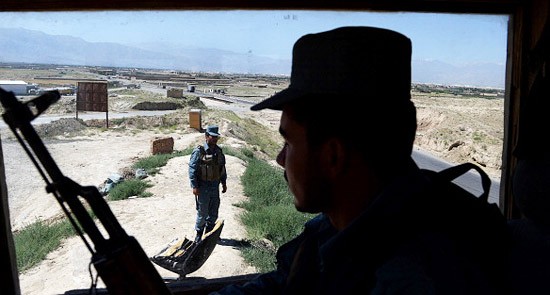
When a war does not have a defined objective that can be equated with victory, it is easy to fudge its definition of defeat. This is the case in Afghanistan.
The US’ “peace with honor” in Vietnam was, by any measure, a defeat. The Vietnamese won their unified state and the US won nothing. In Iraq, also, continued waves of terrorism and a slide back into civil war was not by any measure a success, Saddam Hussein’s death notwithstanding.
Now the US is proposing peace talks with Afghanistan’s Taliban, with Afghan President Hamid Karzai also saying he is looking forward to negotiating with his “brothers”. Whether or not there a “peace agreement” is negotiated, Afghanistan’s future is only as certain as the allied withdrawal scheduled for December next year.
Foreign troops will depart, the Afghan National Army will collapse, and Afghanistan will revert at least for a while to a bloodier and more retributive version of what it was before the allied invasion. At least some Taliban will be out for vengeance, and there will be a continued commitment to assist their Islamist brothers, be they al-Qaeda, any one of a dozen of Pakistan’s domestic Islamist terrorist groups or more than 30 Pakistani trans-national terrorist organisations.
For himself, Karzai will not remain long. No matter what assurances he might receive before the allied withdrawal, he is seen as an illegitimate, deeply corrupt and fairly brutal US puppet, which is a broad but not inaccurate summation of his political qualities.
When the Soviet Union left the “bear trap” of Afghanistan in 1989, its puppet, president Mohammad Najibullah, clung to power for three years of civil war before hiding in the UN mission headquarters for a further four years. After winning the civil war, the Taliban took Najibullah from the UN, castrated him and then dragged him behind a truck through the streets, finally hanging his corpse from a lamp post.
Najibullah also tried a process of “reconciliation”. But Karzai will be keenly aware of Najibullah’s fate, and his travel agent will be lining up many departure options.
With the date of the allied withdrawal so public, the Taliban has in effect already won. It is just waiting for the clock to tick over.
As with the Soviet Union and Najibullah, the US will support the Karzai regime, at least for a while. But that assumes Afghanistan’s soldiers don’t immediately desert in the face of the obvious. At best, those identified as the Taliban’s enemies will be hoping to be able to make good an escape before the door slams shut.
Of those who do manage to flee, more than a few will end up as “irregular arrivals” in Australia. One wonders if the new minister for immigration will still be using the line that they should not be seeking asylum as there is no more war in their country, which is used for some Iraqi and Sri Lankan refugees.
For the architects of the Afganistan war, however, the withdrawal will be cloaked in something akin to “peace with honour”. They will know, however, that regardless of what agreements might or, more likely might not, be reached with the Taliban, there will be no peace in Afghanistan until one side — undoubtedly the Taliban — has again cemented its rule over the country. There will be no “honour” in any of it.
But by then, the West’s regional security concerns in that part of the world will have locked onto Pakistan. Afghanistan is so last year; Pakistan is the focus of longer-term strategic planning.
*Professor Damien Kingsbury is director of the Centre for Citizenship, Development and Human Rights at Deakin University








Half-arsed invasion with half the resources needed for the job sent to Iraq – they couldn’t wait to get out?
They give “honour” a new definition?
Damien, neither was it a “war with honour”. The invasion of Afghanistan was based on just as many lies as the later invasion of Iraq. It is now well established that the invasion was decided on in July 2001, well before the ostensible excuse of the events of 11 September 2001.
As with Iraq, it had more to do with securing access to the vast resources of the Caspian basin, establishing military bases in Afghanistan and the former Soviet republics to the north as part of the strategy of full spectrum dominance and “containment” of Russia and China, and not incidentally resurrecting the lucrative drug traffic that had been almost eradicated by the Taliban government.
The Americans have no intention of entirely leaving Afghanistan after the end of next year, as is evidenced in part by their agreement with the puppet Karzai to maintain 14 military bases after the “withdrawal”. It will be a moot point as to how long they will last under the new Taliban government that looks the inevitable victor of this miserable charade.
As with the long history of post world war 2 war crimes by the west in pursuit of their global ambitions the chances of any of the perpetrators of this disaster appearing in the dock in The Hague look vanishingly remote.
Spot on, but Australia is rushing around the world trying to demand that the expected larger outflow of Afghans must be stopped from ever asking us for help.
@shepherdmarilyn: If tony and his pals get to make government the expected larger flows will be blamed on the current government policies. Scott Morrison will feign outrage; and the turn back the boats mantra will be shown up for what it is – just a mantra that has the same chance of success as that of an ocean going tadpole making it from Darwin to Christmas Island.
Mate, I’m not sure how you’ve come to all of your “conclusions” in this article. But it’s chump journalism. Afghanistan is a mess, but this article is a cuff, and far messier..